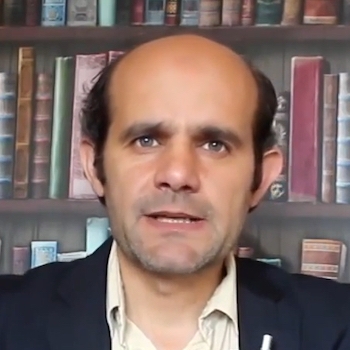
The Arrogant Realism
The prevailing state of international anarchy – where no higher overarching power can control, monitor, or hence judge the behaviors and the activities of states and non-state actors – has always contributed heavily to crises, calamities, and wars. However, anarchy is not a new phenomenon in our world order. In fact, the world order may always have been an anarchical system to the extent we can say that anarchy is a natural world phenomenon. But what makes the implications of international anarchy more vicious and more catastrophic on the international stage is the associated state of unipolarity, where the United States emerged in the aftermath of the Cold War as the only superpower; and where it has acted ever since in arrogance. As unipolarity has created imbalance in the world order, unipolarity with anarchy creates arrogance. I believe that such arrogance is the main cause of instability and violence around the world today, and especially in the Middle East.
The United Nations as an international institution was established in the aftermath of the Second World War, yet it could be argued that it has failed on many occasions to present itself as a neutral yet supreme body, which can enjoy the same level of influence and authority upon all states across the world. Therefore, the United Nations is unable to mend the damaging effects of anarchy and unipolarity – or both together. In fact, the United Nations’ authority and dignity were suppressed and crushed by American arrogance; it could not stop the American-British invasion of Iraq in 2003 for instance, and more ironically, it was not able to investigate the war crimes that have been reported in that country.
Although realists and other international relations theorists claim that the international system consists of sovereign states, I think complete sovereignty has always been marred by American double polarity: economic polarity and political polarity.
Whilst the American political polarity was achieved in the aftermath of the Soviet Union collapse, the American economic polarity was achieved in the aftermath of the Second World War, when the United States was able to impose itself as the biggest world economy. Its currency became the standard unit of currency in the international market for very important commodities such as gold and petroleum. Therefore, the structure of the international system is one of imbalanced structure; bilateral relations between states in this system are actually tripartite due to the constant involvement of the US dollar. The US is actually involved in most mutual relations between states, they are indirectly benefiting and supporting the US economy and the US position in the world.
The problem we have now is that US national interest is pursued through an arrogant foreign policy, whereby the US does not act in this anarchical international system according to the structure of this system (as the neo-realists assume), but according to its status as the only superpower actor in this system. In other words, the United States seeks its national interests through an arrogant and unaccountable foreign policy, but not through normal interaction with other states based on interdependency in the international system. For instance, the United States – without hesitancy and showing no embarrassment – supports Israel against the Palestinians, backs dictators in the Middle East from the House of Saud to Al Sisi, and above all, invades countries such as Iraq and destroys their heritage and history.
The US sends its drones to anywhere it wants and attacks whomever it wants without consideration to human costs or to popular or formal response. In relation to Syria, the United States tolerated Assad after he used chemical weapons against his own people, and it turns a blind eye to the daily massacres that are committed by the Syrian regime on the Syrian people. In fact, it seems that the US hides behind the Russian-Chinese veto mechanism, particularly in terms of policies regarding the war in Syrian. To some, it appears that it was the US who engineered and brokered the international sanction policy against Iraq in the 1990s that resulted in the deaths of half a million Iraqi children and it would not (and perhaps will not) move a stone for the victims of chemical weapons in Syria.
The link between unipolarity, arrogance, and terrorism is very strong, as unipolarity associated with anarchy leads to arrogance, and arrogant foreign policy breeds more violence around the world. Arrogance always overrides and overcomes rationality, so the United States does not deal with the world’s problems through containment, but through confrontation. Containment has been absent from American foreign policy since the end of the Cold War.
Challenging the will of people while supporting their dictators has created (and is still creating) enormous popular resentment and outrage in the Middle East and North Africa over the years, which has developed into a series of violent struggles and instances of terrorism against American and Western interests. Therefore, terrorism may be the result, but not the cause; the end, but not the beginning; the reaction, but not the action. Such claims can be supported when we notice the absence of terrorism before the direct American and Western involvement in the Middle East.
The American approach towards the popular uprisings and revolutions in the Arab world, known as the Arab Spring, was irrational and irresponsible. Backing the counter-revolutions in those countries was a defying position against the masses, and would generate a disastrous backlash on the whole world in the future. Europe is already starting to feel some elements of this backlash in terms of immigration, terrorism, and regional instability.
It could be argued that the imbalanced world order as a result of unipolarity is making the world a safer place than it would be if there were bipolarity or multipolarity. Whilst bipolarity served as a fertile environment for many proxy wars and conflicts in the Middle East, South America, and Europe, multipolarity could make the world an arena for endless inter-state wars and conflicts. Indeed, unipolarity could be the solution for the world instability, if there is a global justice-seeking and a peace making superpower, but not an arrogant one that supports occupations, illegal settlements, and dictatorships, and invades countries and causes destruction in many parts of the world (including Iraq and Syria).
I think we are witnessing, since the end of the Cold War, the effects that anarchy combined with unipolarity have created; the effects of a new phase in international relation. It is the drones phase, or more academically, the phase of “Arrogant Realism.”

